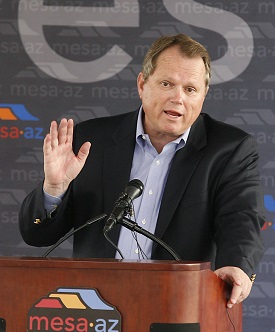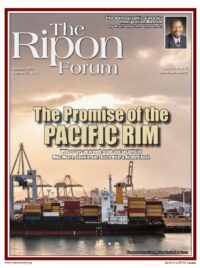by SCOTT SMITH
 The past few years have been rough on American cities. The worst recession in memory put millions of city dwellers out of work, depressed real estate values, and devastated city finances. At the same time, the demand for city services increased. Cities throughout the country scrambled to meet the challenge.
The past few years have been rough on American cities. The worst recession in memory put millions of city dwellers out of work, depressed real estate values, and devastated city finances. At the same time, the demand for city services increased. Cities throughout the country scrambled to meet the challenge.
For the most part, mayors and other city leaders made the tough decisions that resulted in balanced budgets and more efficient operations. You might say they found religion, or at least came face to face with reality. Mayors discovered that by following common sense, conservative fiscal management practices, city government can provide quality services to residents without breaking the bank.
The manner in which city leaders have met the challenges is an example for all levels of government. They recognized that issues could not be ignored or kicked down the road. Regardless of how bad the situation was, potholes had to be filled, trash had to be collected and fire fighters had to respond to a 911 call. The services might have to be adjusted or even scaled back, but the city still needed to respond. To make this happen, problems had to be solved, not simply debated. Compromises had to be reached, and the general welfare of the community had to be at the forefront. Republicans and Democrats had to work together. Core constituencies sometimes had to be disappointed. Many Democrats found themselves at odds with their public employee union friends, while more than a few Republicans accepted or even led the fight to raise revenue in their city. Most of all, mayors from all parts of the political spectrum have learned firsthand how much the overall success of a city is directly connected to the long-term economic success of the businesses within the city.
…mayors from all parts of the political spectrum have learned firsthand how much the overall success of a city is directly connected to the long-term economic success of the businesses within the city.
Mesa, Arizona is no different than other cities in the country. It’s been said that Mesa is the “biggest city you’ve never heard of.” With nearly half a million residents, Mesa is the 38th largest city in the country and experiences many of the same challenges as other big American cities. That includes those brought on by the current financial crisis.
We have struggled with unprecedented shortfalls in city revenue and battled monstrous budget deficits. We faced this crisis using a measured, common sense approach that completely changed the way we do business in Mesa. In doing so, we created a leaner, smarter city; but at the same time we also sought out new opportunities upon which we could build a brighter future.
In 2009, we implemented the largest reorganization of city government in Mesa’s history, reducing the budget nearly 20 percent and significantly reducing the workforce. We restructured, reorganized and refined our processes. We held ourselves accountable for maintaining a high level of service throughout the recession, which we were able to accomplish by being creative and innovative. We made the conscious decision to not survive during the crisis, but to thrive.
Like many, I often look to examples set by great leaders such as Abraham Lincoln for inspiration. I’ve always admired the fact that Lincoln achieved some of his greatest accomplishments during the darkest hours of the Civil War. In the midst of the chaos of the war, and with the Union hanging by a thread, Lincoln pushed through significant legislation that changed the nation forever. This legislation included the Homestead Act, which opened up the west to settlement; the Pacific Railways Act, which made the transcontinental railroad possible; the Morrill Act, which established land-grant colleges; and, the law that created the National Academy of Sciences. These were all designed to move America forward after the fighting was over.
In Mesa, we also found ways to invest in our future while dealing with our problems.
In Mesa, we also found ways to invest in our future while dealing with our problems. During the recession, we: 1) became America’s unique college town by attracting five legacy private liberal arts universities, including the first Catholic university in Arizona, to establish campuses in our downtown; 2) started construction on a three-mile extension of light rail through our downtown; 3) began commercial airline service at Phoenix-Mesa Gateway Airport, a former Air Force Base, and just celebrated our five millionth passenger; 4) built five new fire stations, two new police stations, and over $150 million of street and road improvements; and, 5) engaged citizens in iMesa, a cutting-edge citizen driven process that resulted in voters approving a $70 million bond issue to improve parks in the city. These public investments have attracted millions in new private investment, which forms the foundation for long-term economic growth and improves the quality of life in our community.
Cities across the country have met the challenges of the great recession, and are building for the future. While we must still confront serious issues such as underfunded pensions and the new challenges of a global economy, I am confident that cities can and will continue to lead the way in building a better America. RF
Scott Smith is serving his second term as Mayor of Mesa, Arizona. First elected in 2008, he also serves as the President of the United States Conference of Mayors.




